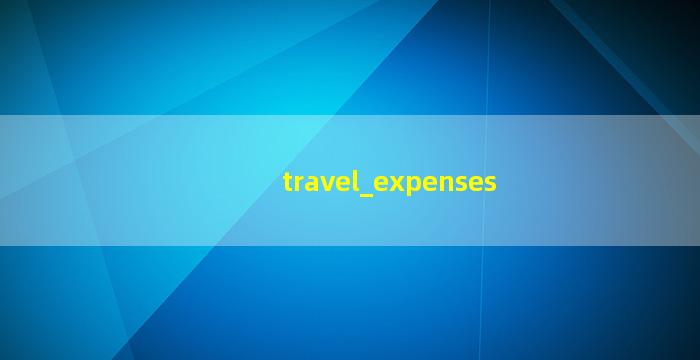旅游费用翻译(旅游的费用用英语怎么说)
1、旅游费用翻译
旅游费用翻译
旅行是一种享受和探索世界的方式,然而,旅游费用的翻译却是一个不容忽视的问题。无论是个人旅游还是团队旅行,了解并准确理解各项费用是确保旅行顺利进行的重要一环。

交通费用
交通费用是旅行中最基本、最重要的一部分。它包括往返机票、火车票或汽车票的费用。旅行者需要确保所购买的票价包含了所有必要的税费和附加费,并清楚了解退改签政策以避免不必要的费用损失。
住宿费用
住宿费用是旅行中的另一个重要方面。它涉及到酒店、民宿或其他住宿方式的预订费用。旅行者需要知道房间类型、价格、入住时间和退房时间等相关信息,并与酒店确认预订细节,以确保旅行期间的舒适和顺利。
餐饮费用
品尝当地美食是旅行的一大乐趣,而餐饮费用则成为旅行中的必不可少的费用之一。了解并计划好每餐的预算,选择合适的餐馆,避免浪费和超支,是确保旅行资金的有效利用。
观光费用
观光费用包括景点门票、导游服务费和旅行团费用等。在规划旅行行程时,旅行者需要详细了解每个景点的门票价格和导游服务费用,以及是否选择参加旅行团。这样可以更好地控制旅行支出,并确保获得最好的观光体验。
小费
在某些国家和地区,给服务人员小费是一种常规的做法。旅行者需要了解当地的小费习惯并做好预算规划,以确保给予服务人员适当的小费,且不超过自己的预算范围。
旅游费用翻译是旅行中不可忽视的一部分。了解并准确理解各项费用,可以有效规划旅行预算,避免不必要的费用损失和资金浪费,让旅行更加顺利和愉快。记得在旅行中拍摄美丽的风景照片,留下美好的回忆。
Note: 图片为示意图片,实际插入图片需替换为真实的链接。
2、旅游的费用用英语怎么说
How to say "travel expenses" in English
Traveling is a great way to explore new places, experience different cultures, and create memories that last a lifetime. However, one important aspect of traveling is the cost involved. Let's take a look at how to say "travel expenses" in English.
In English, the phrase "travel expenses" is commonly used to refer to the amount of money spent on a trip. This includes various costs such as transportation, accommodation, meals, and any additional activities or souvenirs. The term can be used in both casual and formal contexts.
For example, if you are planning a vacation and discussing the financial aspects with a friend, you could say, "I need to budget for my travel expenses, including airfare, hotel, and meals." This clearly indicates that you are considering all the costs associated with your trip.
Another way to express the idea of travel expenses is by saying "cost of travel" or "travel budget." These phrases convey the same meaning and can be used interchangeably with "travel expenses."
It is essential to plan and manage your travel expenses carefully to ensure a smooth and enjoyable trip. Researching and comparing prices for flights, accommodations, and other services can help you find the best deals and save money. Additionally, setting a realistic travel budget and sticking to it can prevent overspending.
Remember, traveling doesn't always have to be expensive. There are ways to optimize your travel expenses without compromising on the quality of your experience. Exploring affordable accommodation options, choosing local eateries, and taking advantage of free attractions and activities are just a few strategies to consider.
In conclusion, "travel expenses" is the common term used to refer to the cost of a trip in English. Planning and managing your travel expenses well can ensure a memorable and enjoyable adventure. So, whether you are a frequent traveler or a planning your first trip, consider these tips to make the most of your travel budget.

3、旅游费用的英文怎么说
Travel Expenses in English
Traveling is a wonderful way to explore new places, experience different cultures, and create lasting memories. However, one important aspect of traveling that cannot be overlooked is the cost involved. Understanding the concept and vocabulary related to travel expenses is essential for any travel enthusiast. Let's take a look at some key words and phrases in English.
1. Flight: The cost of the airplane ticket is often one of the most significant expenses when traveling. It can vary greatly depending on the destination, time of year, and airline.
2. Accommodation: Finding a place to stay is another crucial aspect of travel expenses. Hotels, hostels, and vacation rentals are some common options available. The price can vary based on the location, amenities, and quality of the accommodation.
3. Transportation: Getting around in a new city or country requires some form of transportation. Whether it's taxis, buses, trains, or rental cars, the cost of transportation can add up quickly.
4. Meals: Food is an essential part of the travel experience. Dining out, trying local cuisines, and exploring street food can be both exciting and expensive. It's important to budget for meals to ensure you don't overspend.
5. Activities: Sightseeing, entrance fees to attractions, guided tours, and adventure activities are all part of the travel experience. These activities often come with additional costs that should be considered when planning a trip.
6. Souvenirs: Many travelers like to bring back souvenirs to commemorate their adventures. Budgeting for souvenirs is necessary to avoid overspending on mementos.
It's important to note that travel expenses can vary greatly depending on the destination, duration of the trip, and personal preferences. It's always a good idea to research and plan ahead, as well as set a budget for each category of expense to ensure a smooth and enjoyable travel experience.

4、旅游费用翻译成英文
Translation of Travel Expenses into English
Travelling is an amazing way to explore different cultures, experience new adventures, and create lifelong memories. However, one important aspect of travel planning is managing and understanding the travel expenses. Here is a guide to help you understand and translate travel expenses into English.
When it comes to accommodation, the term "旅馆费用" can be translated as "hotel expenses." This includes the cost of staying in hotels, motels, or other types of accommodation during your trip.
For transportation, you can use the term "交通费用" which can be translated as "transportation expenses." This covers the costs of flights, train tickets, bus fares, taxi rides, and any other mode of transportation you use during your journey.
Meals and dining expenses are often referred to as "饮食费用" in Chinese. This can be translated as "food and beverage expenses" in English. It includes the cost of meals at restaurants, cafes, or street food stalls.
Sightseeing and entrance fees are commonly known as "景点门票费用" in Chinese. In English, you can refer to them as "attraction admission fees" or simply "sightseeing expenses." This includes the cost of visiting museums, historical sites, theme parks, or any other tourist attractions.
Shopping expenses are often a part of travel, and in Chinese, it is called "购物费用." In English, you can simply use the term "shopping expenses." This covers the cost of purchasing souvenirs, clothing, accessories, or any other items you buy during your trip.
Miscellaneous expenses such as "杂费" or "其他费用" can be translated as "miscellaneous expenses" or "other expenses" in English. This includes any additional costs that are not classified under the above categories, such as visa fees, travel insurance, or emergency expenses.
Remember, it's always important to keep track of your travel expenses and budget accordingly. By understanding and translating your travel expenses into English, you can effectively plan your trip and ensure a smooth journey.


.jpg)
.jpg)
.jpg)
.jpg)
.jpg)
.jpg)